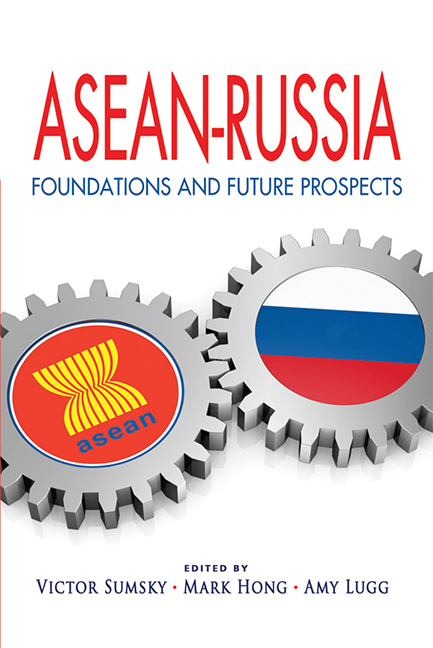Book contents
- Frontmatter
- Contents
- Foreword
- Preface
- About the Contributors
- Keynote Address
- Opening Remarks
- Keynote Address
- Introduction: Russia and the ASEAN Member States: Political and Economic Cooperation in Progress
- SECTION I WISEMEN'S VIEWS
- SECTION II GEOPOLITICS
- SECTION III BILATERAL RELATIONS
- SECTION IV Business and Economics
- SECTION V CULTURE AND EDUCATION
- Credentials of Literature
- A Sentimental Journey through ASEAN (in the Russian Way)
- Food for the Soul and the Stomach
- No Books about Singapore in Russian? Give me a Break! (An Editor's Note)
- National University of Singapore (NUS)-Russia: State of Collaboration
- Soft Power: A Comparison between Britain, France and Russia
- EPILOGUE
- Index
Soft Power: A Comparison between Britain, France and Russia
from SECTION V - CULTURE AND EDUCATION
Published online by Cambridge University Press: 21 October 2015
- Frontmatter
- Contents
- Foreword
- Preface
- About the Contributors
- Keynote Address
- Opening Remarks
- Keynote Address
- Introduction: Russia and the ASEAN Member States: Political and Economic Cooperation in Progress
- SECTION I WISEMEN'S VIEWS
- SECTION II GEOPOLITICS
- SECTION III BILATERAL RELATIONS
- SECTION IV Business and Economics
- SECTION V CULTURE AND EDUCATION
- Credentials of Literature
- A Sentimental Journey through ASEAN (in the Russian Way)
- Food for the Soul and the Stomach
- No Books about Singapore in Russian? Give me a Break! (An Editor's Note)
- National University of Singapore (NUS)-Russia: State of Collaboration
- Soft Power: A Comparison between Britain, France and Russia
- EPILOGUE
- Index
Summary
INTRODUCTION
The concept of “soft power” as defined by leading academic and international relations expert Joseph Nye Jr in 1990 referred specifically to “the ability to get what you want through attraction rather than coercion”. According to a recent research proposal from Chatham House in the United Kingdom, “The conventional wisdom is that Russia has no soft power.” This might on first reading seem to be an unfair assessment however, when compared to other former Empires such as Britain and France, at face value this does seem a rather accurate statement. This paper aims to examine the implementation of soft power by Britain and France and how Russia can learn from these examples to bolster Russian influence on the global stage.
BRITAIN'S SOFT POWER
Britain and her use of soft power has largely been the product of her former Empire. Through colonization and expansion, the utilization of English as the lingua franca among the people of the world today is perhaps the most overlooked symbol of soft power, and one which has been highly advantageous to Britain and her standing on the world stage. Long before the term “soft power” was developed as a concept, Britain was conscious of its role and influence in the world and the importance of fostering cultural ties and links with the rest of the world. This was highlighted in particular by the formation of the British Committee for Relations with Other Countries, what we now know as the British Council in 1934, whose specific aim was to “improve the understanding of Britain across the world”. The strategies and methods in which the British Council has achieved this include:
• Arranging for lecturers to be sent overseas
• Supporting British institutes and societies and English schools in other Countries
• Arranging visits for individuals to the UK
• Organizing music performances and art exhibitions
- Type
- Chapter
- Information
- ASEAN-RussiaFoundations and Future Prospects, pp. 313 - 322Publisher: ISEAS–Yusof Ishak InstitutePrint publication year: 2012



